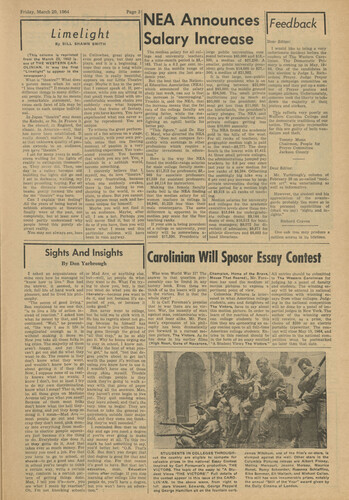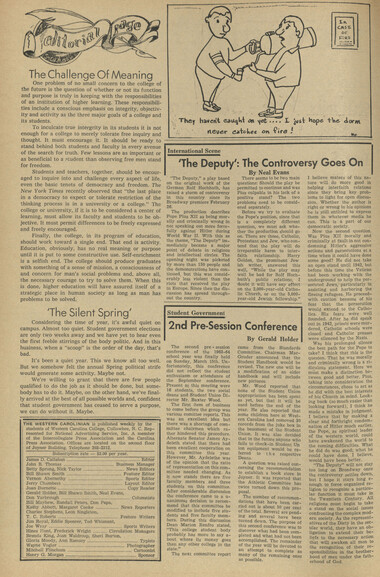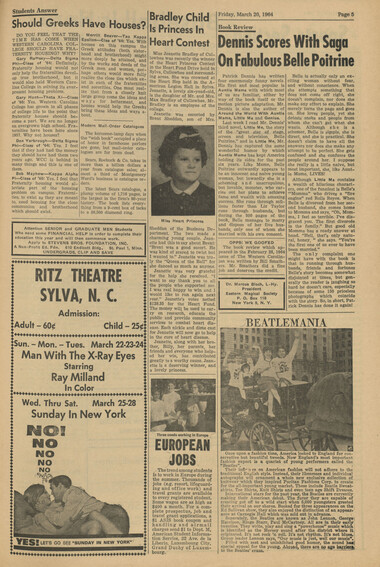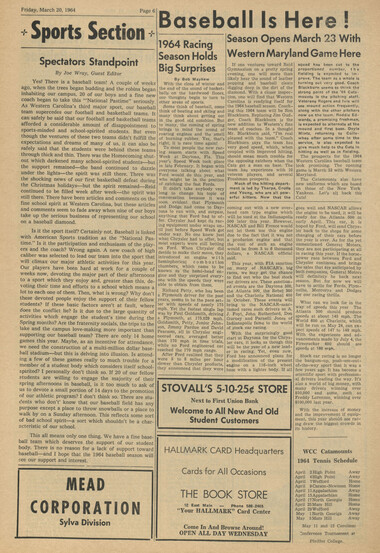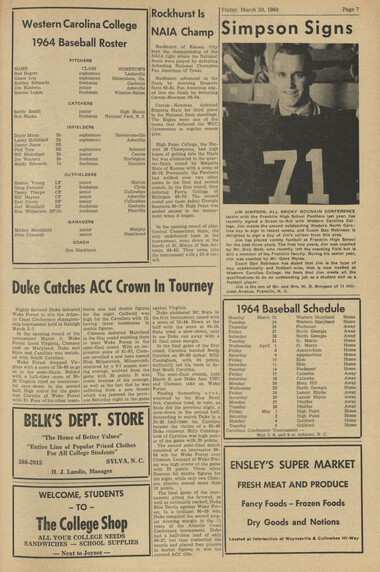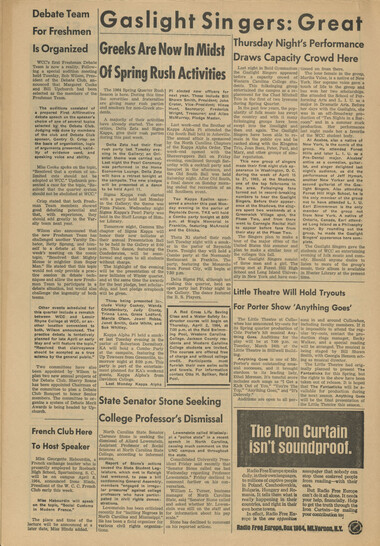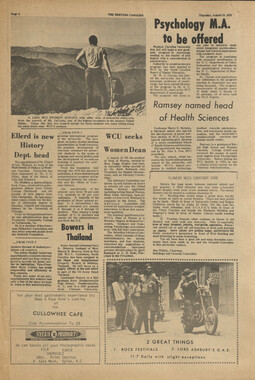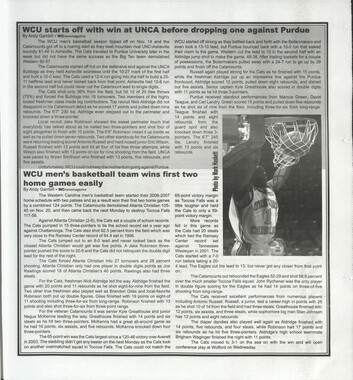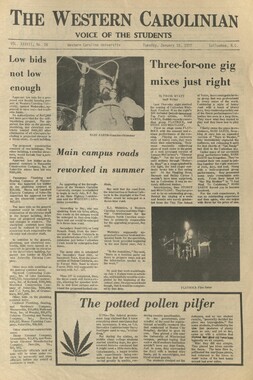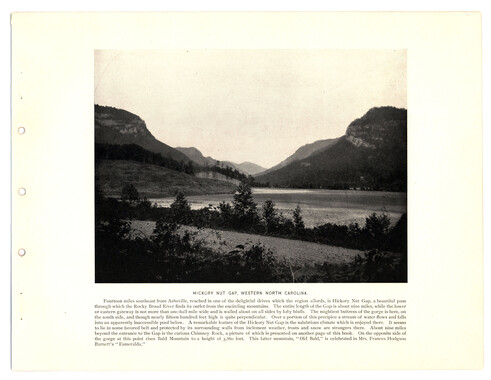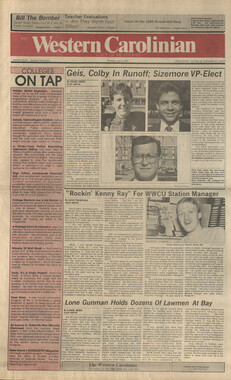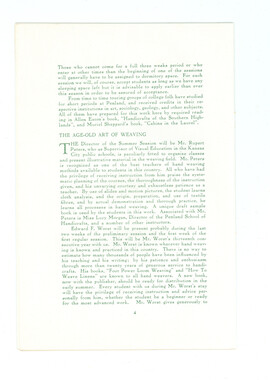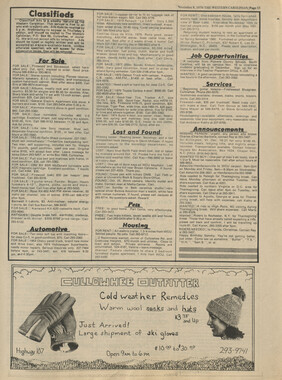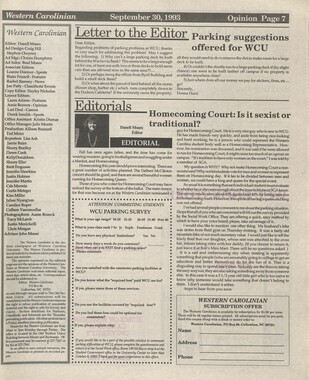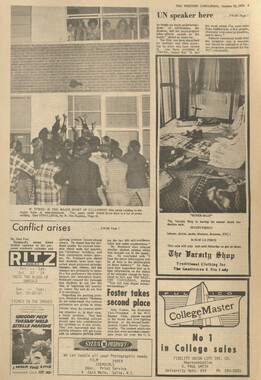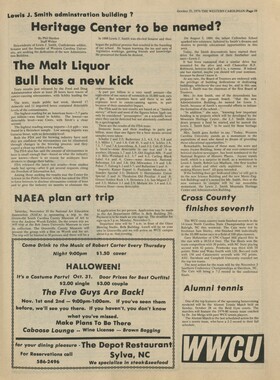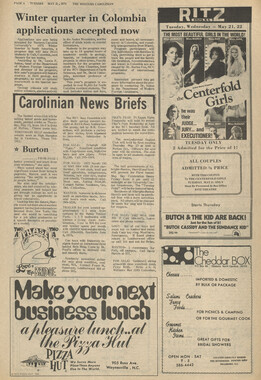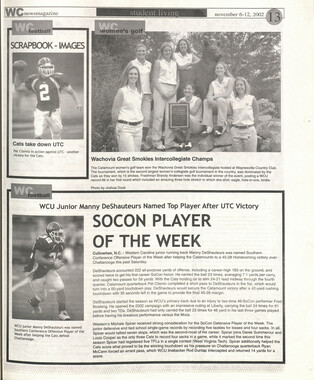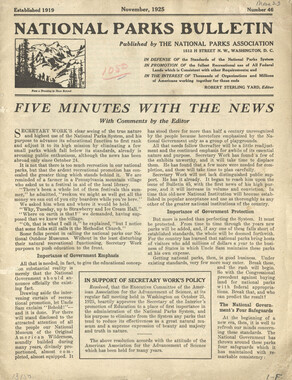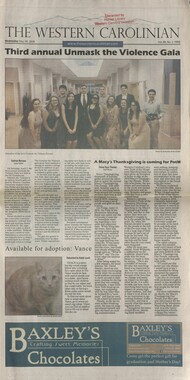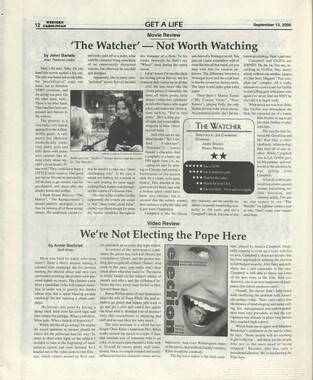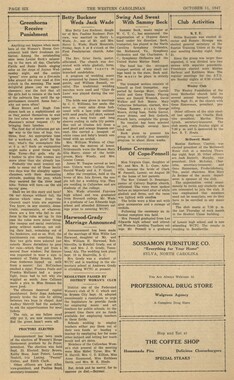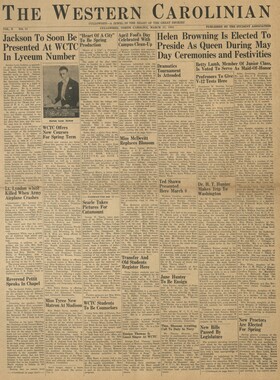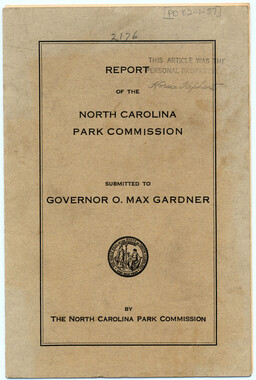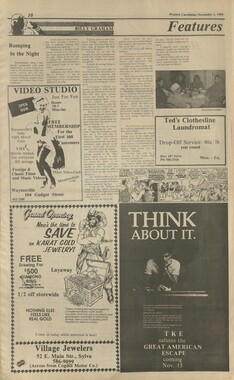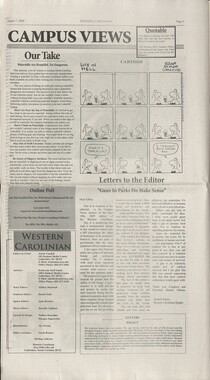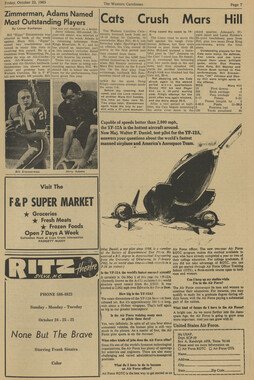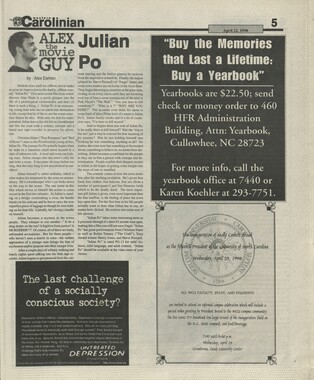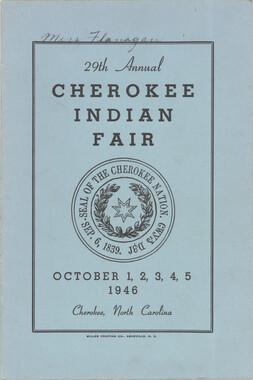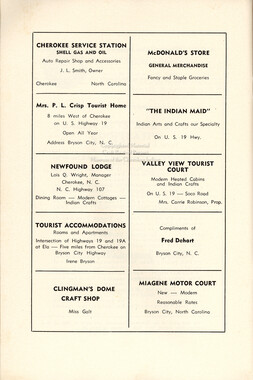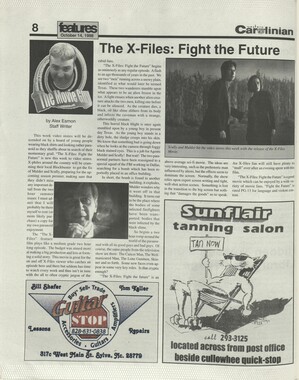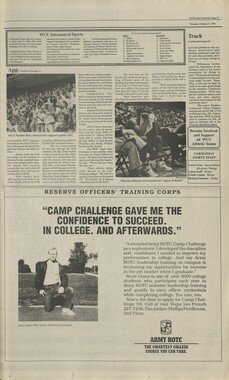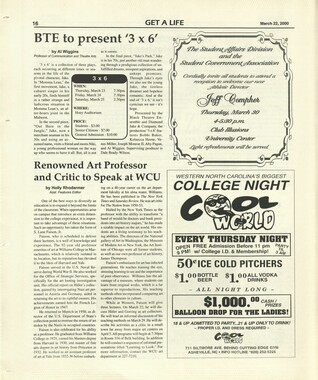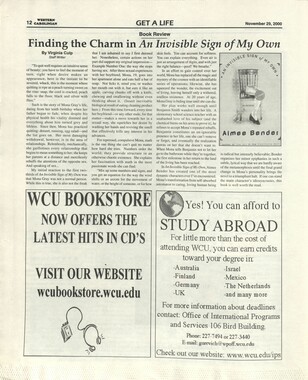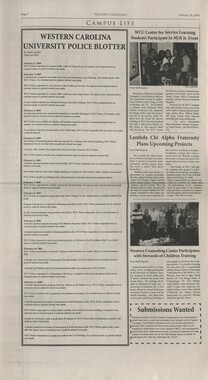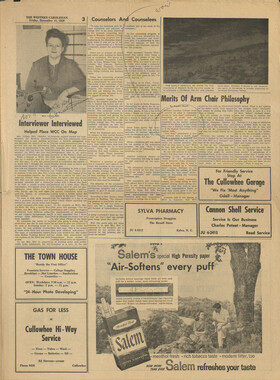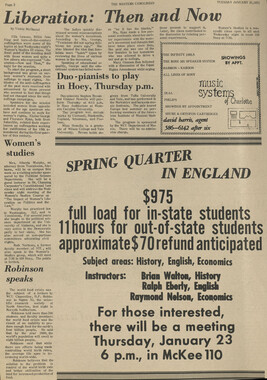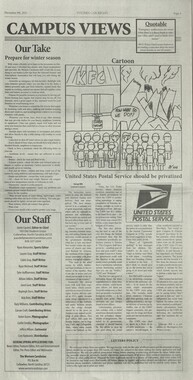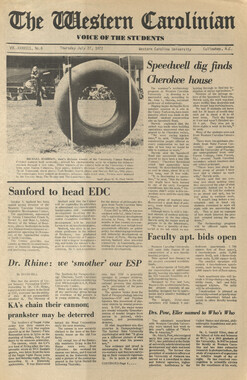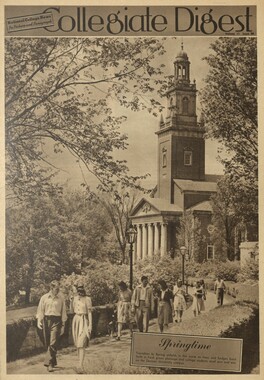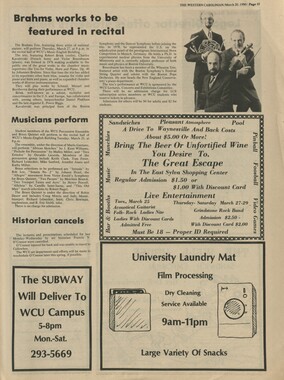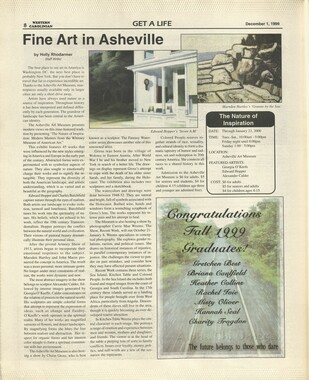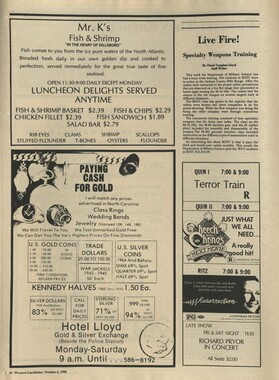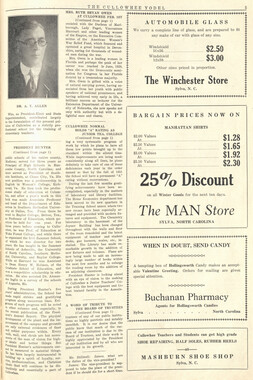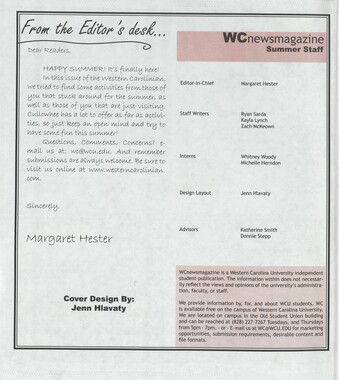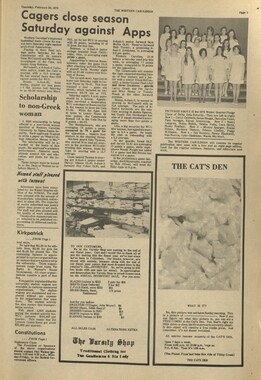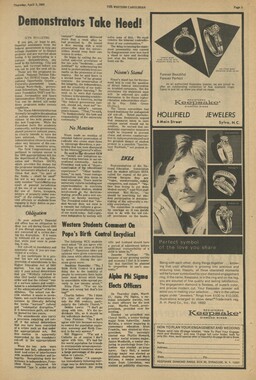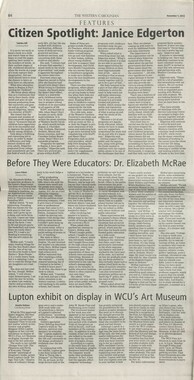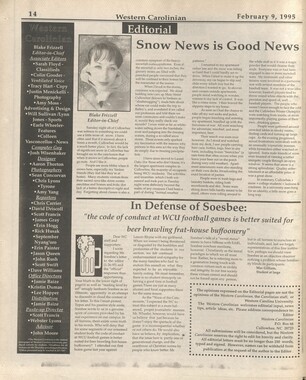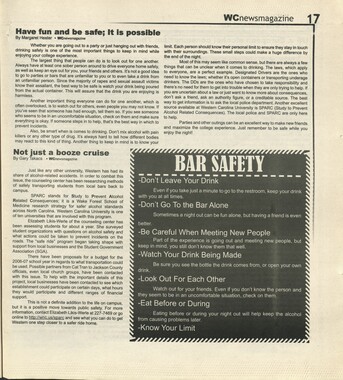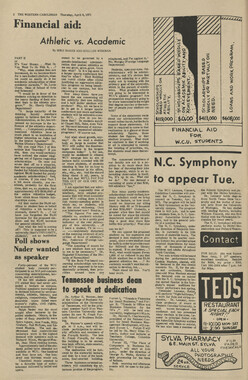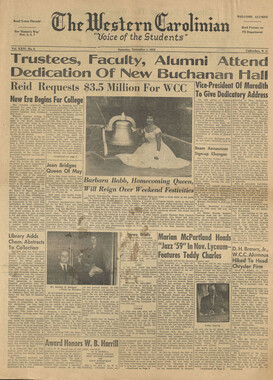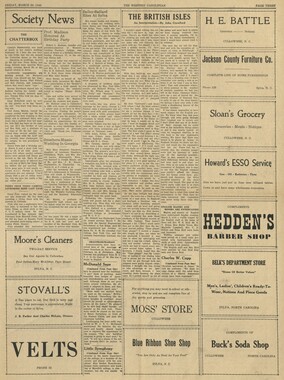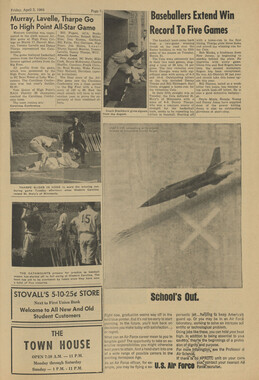Western Carolina University (21)
View all
- Canton Champion Fibre Company (2308)
- Cherokee Traditions (291)
- Civil War in Southern Appalachia (165)
- Craft Revival (1942)
- George Masa Collection (137)
- Great Smoky Mountains - A Park for America (2900)
- Highlights from Western Carolina University (422)
- Horace Kephart (973)
- Journeys Through Jackson (159)
- LGBTQIA+ Archive of Jackson County (85)
- Oral Histories of Western North Carolina (316)
- Picturing Appalachia (6797)
- Stories of Mountain Folk (413)
- Travel Western North Carolina (153)
- Western Carolina University Fine Art Museum Vitreograph Collection (129)
- Western Carolina University Herbarium (92)
- Western Carolina University: Making Memories (738)
- Western Carolina University Publications (2491)
- Western Carolina University Restricted Electronic Theses and Dissertations (146)
- Western North Carolina Regional Maps (71)
- World War II in Southern Appalachia (131)
University of North Carolina Asheville (6)
View all
- Allanstand Cottage Industries (62)
- Appalachian National Park Association (53)
- Bennett, Kelly, 1890-1974 (1463)
- Berry, Walter (76)
- Brasstown Carvers (40)
- Carver, George Washington, 1864?-1943 (26)
- Cathey, Joseph, 1803-1874 (1)
- Champion Fibre Company (233)
- Champion Paper and Fibre Company (297)
- Cherokee Indian Fair Association (16)
- Cherokee Language Program (22)
- Crowe, Amanda (40)
- Edmonston, Thomas Benton, 1842-1907 (7)
- Ensley, A. L. (Abraham Lincoln), 1865-1948 (275)
- Fromer, Irving Rhodes, 1913-1994 (70)
- George Butz (BFS 1907) (46)
- Goodrich, Frances Louisa (120)
- Grant, George Alexander, 1891-1964 (96)
- Heard, Marian Gladys (60)
- Kephart, Calvin, 1883-1969 (15)
- Kephart, Horace, 1862-1931 (313)
- Kephart, Laura, 1862-1954 (67)
- Laney, Gideon Thomas, 1889-1976 (439)
- Masa, George, 1881-1933 (61)
- McElhinney, William Julian, 1896-1953 (44)
- Niggli, Josephina, 1910-1983 (10)
- North Carolina Park Commission (105)
- Osborne, Kezia Stradley (9)
- Owens, Samuel Robert, 1918-1995 (11)
- Penland Weavers and Potters (36)
- Roberts, Vivienne (15)
- Roth, Albert, 1890-1974 (142)
- Schenck, Carl Alwin, 1868-1955 (1)
- Sherrill's Photography Studio (2565)
- Southern Highland Handicraft Guild (127)
- Southern Highlanders, Inc. (71)
- Stalcup, Jesse Bryson (46)
- Stearns, I. K. (213)
- Thompson, James Edward, 1880-1976 (226)
- United States. Indian Arts and Crafts Board (130)
- USFS (683)
- Vance, Zebulon Baird, 1830-1894 (1)
- Weaver, Zebulon, 1872-1948 (58)
- Western Carolina College (230)
- Western Carolina Teachers College (282)
- Western Carolina University (2008)
- Western Carolina University. Mountain Heritage Center (18)
- Whitman, Walt, 1819-1892 (10)
- Wilburn, Hiram Coleman, 1880-1967 (73)
- Williams, Isadora (3)
- Cain, Doreyl Ammons (0)
- Crittenden, Lorraine (0)
- Rhodes, Judy (0)
- Smith, Edward Clark (0)
- Appalachian Region, Southern (2959)
- Asheville (N.C.) (1944)
- Avery County (N.C.) (26)
- Blount County (Tenn.) (195)
- Buncombe County (N.C.) (1680)
- Cherokee County (N.C.) (283)
- Clay County (N.C.) (556)
- Graham County (N.C.) (238)
- Great Smoky Mountains National Park (N.C. and Tenn.) (525)
- Haywood County (N.C.) (3573)
- Henderson County (N.C.) (70)
- Jackson County (N.C.) (4919)
- Knox County (Tenn.) (35)
- Knoxville (Tenn.) (13)
- Lake Santeetlah (N.C.) (10)
- Macon County (N.C.) (421)
- Madison County (N.C.) (216)
- McDowell County (N.C.) (39)
- Mitchell County (N.C.) (135)
- Polk County (N.C.) (35)
- Qualla Boundary (982)
- Rutherford County (N.C.) (78)
- Swain County (N.C.) (2185)
- Transylvania County (N.C.) (270)
- Watauga County (N.C.) (12)
- Waynesville (N.C.) (86)
- Yancey County (N.C.) (72)
- Aerial Photographs (3)
- Aerial Views (60)
- Albums (books) (4)
- Articles (1)
- Artifacts (object Genre) (228)
- Bibliographies (1)
- Biography (general Genre) (2)
- Cards (information Artifacts) (38)
- Clippings (information Artifacts) (192)
- Copybooks (instructional Materials) (3)
- Crafts (art Genres) (622)
- Depictions (visual Works) (21)
- Design Drawings (1)
- Digital Moving Image Formats (2)
- Drawings (visual Works) (185)
- Envelopes (101)
- Exhibitions (events) (1)
- Facsimiles (reproductions) (1)
- Fiction (general Genre) (4)
- Financial Records (12)
- Fliers (printed Matter) (67)
- Glass Plate Negatives (381)
- Guidebooks (2)
- Internegatives (10)
- Interviews (817)
- Land Surveys (102)
- Letters (correspondence) (1045)
- Manuscripts (documents) (618)
- Maps (documents) (177)
- Memorandums (25)
- Minutes (administrative Records) (59)
- Negatives (photographs) (6090)
- Newsletters (1290)
- Newspapers (2)
- Notebooks (8)
- Occupation Currency (1)
- Paintings (visual Works) (1)
- Pen And Ink Drawings (1)
- Periodicals (193)
- Personal Narratives (10)
- Photographs (12976)
- Plans (maps) (1)
- Poetry (6)
- Portraits (4568)
- Postcards (329)
- Programs (documents) (181)
- Publications (documents) (2444)
- Questionnaires (65)
- Relief Prints (26)
- Sayings (literary Genre) (1)
- Scrapbooks (282)
- Sheet Music (2)
- Slides (photographs) (402)
- Songs (musical Compositions) (2)
- Sound Recordings (796)
- Specimens (92)
- Speeches (documents) (18)
- Tintypes (photographs) (8)
- Transcripts (324)
- Text Messages (0)
- A.L. Ensley Collection (275)
- Appalachian Industrial School Records (7)
- Appalachian National Park Association Records (336)
- Axley-Meroney Collection (2)
- Bayard Wootten Photograph Collection (20)
- Bethel Rural Community Organization Collection (7)
- Blumer Collection (5)
- C.W. Slagle Collection (20)
- Canton Area Historical Museum (2110)
- Carlos C. Campbell Collection (462)
- Cataloochee History Project (64)
- Cherokee Studies Collection (4)
- Daisy Dame Photograph Album (5)
- Daniel Boone VI Collection (1)
- Doris Ulmann Photograph Collection (112)
- Elizabeth H. Lasley Collection (1)
- Elizabeth Woolworth Szold Fleharty Collection (4)
- Frank Fry Collection (95)
- George Masa Collection (173)
- Gideon Laney Collection (452)
- Hazel Scarborough Collection (2)
- Hiram C. Wilburn Papers (28)
- Historic Photographs Collection (236)
- Horace Kephart Collection (861)
- Humbard Collection (33)
- Hunter and Weaver Families Collection (1)
- I. D. Blumenthal Collection (4)
- Isadora Williams Collection (4)
- Jesse Bryson Stalcup Collection (47)
- Jim Thompson Collection (224)
- John B. Battle Collection (7)
- John C. Campbell Folk School Records (80)
- John Parris Collection (6)
- Judaculla Rock project (2)
- Kelly Bennett Collection (1482)
- Love Family Papers (11)
- Major Wiley Parris Civil War Letters (3)
- Map Collection (12)
- McFee-Misemer Civil War Letters (34)
- Mountain Heritage Center Collection (4)
- Norburn - Robertson - Thomson Families Collection (44)
- Pauline Hood Collection (7)
- Pre-Guild Collection (2)
- Qualla Arts and Crafts Mutual Collection (12)
- R.A. Romanes Collection (681)
- Rosser H. Taylor Collection (1)
- Samuel Robert Owens Collection (94)
- Sara Madison Collection (144)
- Sherrill Studio Photo Collection (2558)
- Smoky Mountains Hiking Club Collection (616)
- Stories of Mountain Folk - Radio Programs (374)
- The Reporter, Western Carolina University (510)
- Venoy and Elizabeth Reed Collection (16)
- WCU Gender and Sexuality Oral History Project (32)
- WCU Mountain Heritage Center Oral Histories (25)
- WCU Oral History Collection - Mountain People, Mountain Lives (71)
- WCU Students Newspapers Collection (1923)
- Western North Carolina Tomorrow Black Oral History Project (69)
- William Williams Stringfield Collection (2)
- Zebulon Weaver Collection (109)
- African Americans (390)
- Appalachian Trail (35)
- Artisans (521)
- Cherokee art (84)
- Cherokee artists -- North Carolina (10)
- Cherokee language (21)
- Cherokee pottery (101)
- Cherokee women (208)
- Church buildings (190)
- Civilian Conservation Corps (U.S.) (111)
- College student newspapers and periodicals (2012)
- Dams (108)
- Dance (1023)
- Education (222)
- Floods (63)
- Folk music (1015)
- Forced removal, 1813-1903 (2)
- Forest conservation (220)
- Forests and forestry (1197)
- Gender nonconformity (4)
- Great Smoky Mountains National Park (N.C. and Tenn.) (181)
- Hunting (46)
- Landscape photography (25)
- Logging (119)
- Maps (83)
- Mines and mineral resources (9)
- North Carolina -- Maps (18)
- Paper industry (38)
- Postcards (255)
- Pottery (135)
- Railroad trains (72)
- Rural electrification -- North Carolina, Western (3)
- School integration -- Southern States (2)
- Segregation -- North Carolina, Western (5)
- Slavery (5)
- Sports (452)
- Storytelling (243)
- Waterfalls -- Great Smoky Mountains (N.C. and Tenn.) (66)
- Weaving -- Appalachian Region, Southern (280)
- Wood-carving -- Appalachian Region, Southern (328)
- World War, 1939-1945 (173)
Western Carolinian Volume 29 Number 19
Item
Item’s are ‘child’ level descriptions to ‘parent’ objects, (e.g. one page of a whole book).
-
-
Friday, March 20, 1964 Page 3 Limelight By BILL SHAWN SMITH (This column is reprinted from the March 23, 1962 issue of THE WESTERN CAR- OLINIAN. It was the first "Limelight" to appear in the newspaper.) What is "theatre?" What does a person mean when he says "I love theatre?" It means many different things to many different people. This is by no means a remarkable statement, because each facet of life may be unique to each unique individual. In Japan "theatre" may mean the Kabuki, or No. In France it is the absurd; in England, the classic. In America—well, that has never been established. It really doesn't matter. As long as that unknown quality of passion extends to an audience, you Ijave "theatre." I sat for many years in audiences waiting for the lights of reality to extinguish themselv es. They never did. Then, one day in a rather baroque old building the lights did go and I sat in darkness, waiting, my heart pounding, hoping. Far off in the distance rose-colored beams gently formed life and for me "theatre" was born. Can I explain that feeling? All the years of being bored in nebbish attempts at theatrics finally were of the past, not completely, but at least now I could partly understand why people loved this purely abstract reality. You may not always see, here NEA Announces Salary Increase in Cullowhee, great plays or even good plays, but they are plays, and it is a beginning. I hope that once in a long while something, some little something that is really beautiful, appears on our Little Theatre stage. Maybe it has in the past; that I cannot speak of. If, perchance, while you are sitting in that small room filled with uncomfortable wooden chairs you suddenly care what happens behind that frame of fantasy, then you have known. You have experienced what can never a- gain be reproduced. You are unique. To witness the great performance of a fan actress on a stage, to actually, with your own portals, sense that one fleeting moment of passion is a very humbling experience. You transcend yourself. You become that which you are not. You, a nebbish in a nebbish world, become something. I sincerely believe that I, myself, me, do love "theatre." It's very frustrating, because when one suddenly awakes, there is that feeling to run shouting to the world, to explain, to share. But you cannot. Each person must seek and become unique for himself. Maybe you will not find it in an audience. Maybe, after all, I am a not. Perhaps you will never find it, but if you do or if you have, then you will know what I mean and this particular column will have been in vain anyway. The median salary for all college and university teachers for a nine-month period is $8,- 163. That is a 6.2 per cent into the middle range of college pay since the last academic year. But the best that the National Education Association (NEA) which announced the salary study last week, can say is that the increase is "encouraging." Trouble is, said the NEA, that the increase means that the fat cats of the college faculty are getting fatter, while the majority of college teachers are fighting an uphill battle for better pay. '"This figure," said Dr. Ray C. Maul, who directed the NEA study, "does not compare favorably with earnings in other professions which require a similar investment in education." Here is the way the NEA found the middle-range salaries for male college faculty members: $11,312 for professors; $8,- 969 for associate professors; $7,539 for assistant professors; and $6,114 for instructors. Making the female faculty- ranks boil is the NEA finding that the median salary for all women teachers in college is $6,940, $1,223 less than their male counterparts. The same difference is apparent in the median pay scale for the four teaching ranks. If your aim is being president of a college or university, your salary will be somewhere a- round $17,330. Presidents of Sights And Insights By Don Yarbrough large public universities com mand between $45,000 and $18,- 500, a median of $27,250. A smaller, public university ident gets from $14,000 to $27,- 500, a median of $21,582. It is that large, non-public university i who is on top, getting between $22,000 and $45,000; the middle ground is $34,500. The small private Institutions pay as much as $35,000 to the president; but most get less than $11,000. In the hinterlands, the president's salary plunges. The NEA said there are 40 presidents of small private colleges getting less than $10,000 annually. The NEA found the academic gold in the hills of the west. For all ranks of teachers, the geographic median high is paid in the west—$8,777. The deep South is the lowest with $7,412. At those small private colleges, the administrations jumped pay brackets by 5.6 per cent since last year to a new median for low ranks of $6,264. Offsetting the seemingly big hike was a 6 per cent pay increase by large private universities during the same period for a median high of $9,318 in all ranks of teaching. Median salaries for university and colleges for the academic executive levels show these medians: $13,644 for undergraduate college deans; $9,144 for deans of men; $10,512 for business managers; $9,572 for directors of admission; $9,871 for athletic directors and $8,883 for head librarians. Feedback I would lik. | a very unfortiin.i it before the >t The Western Carolinian. The Democratic Primary is coming up in May, 19- 64. One of the candidates in this election is Judge L. Richardson Preyer. Judge Preyer has a campaign committee on campus and they put up a num- of Preyer posters and bumper stickers. Unfortunately, someone took the liberty to take down the majority of their, posters and stickers. This reflects very poorly on Western Carolina College and the democratic traditions of our nation. The people responsible for this are guilty of both vandalism and theft. Tommy Mann Chairman, People for Preyer Committee Jackson County Dear Editor: Mr. Yarbrough's column of February 28 on so-called "modern art" was entertaining as well as informative. However, the student and his appreciation of the avante- garde probably lies more so in personal capabilities of (shall we say) "sights and insights." Richard Craven One oak tree may produce a million acorns in its lifetime. I asked an acquaintance of mine once how he managed to "know how to live." Ben had the answer, it seemed, to a rich, full life of hard work and pleasure, and he lived his philosophy. "The secret of good living," Ben explained to me one day, "is to live a life of action instead of reaction." I asked him what he meant by that, and he continued. "Well," he proceeded, "the way I see it life is complicated enough as it is without making it more so. Now you take all those folks in big cities. The majority of them aren't happy, and yet they can't get out and do what they want to do. The reason is they don't know what they want, and wouldn't know how to go about getting it if they did. Now, I suppose none of us really knows what he wants; I know I don't, but at least I try to do my own discriminating, know what I mean? That is, why let all those guys on Madison Avenue tell you what you need? Because of them most folks don't know what the hell they- are doing, and yet they keep on doing it. I mean—Mad Ave — most people go out and buy crap they don't need, sink money into everything from medicine to electric pimple squeezers just because it's the thing to do. Everybody else does it, so they gotta do it. And that takes ever so much money. For money you need a job. For that you have to go to school, or should—to get a good one. And in school you're taught to think a certain way, write a certain way, conform to a certain pattern of getting things done. Man, I tell you it's—now, you see what I mean by reaction? Oh, I'm not knocking schools Carolinian Will Sposor Essay Contest or Mad Ave, or anything else, but—well, let people do what they want to do. What I'm trying to show you, boy, is that you must do what you do deliberately—because you want to do it, and not because it's expected of you, or because it looks good." Ben never went to college, but he told me to stick with it. He has no regrets about not going because he himself has found how to live without having gone through the grind of "all that crap," as he so ably put it. Why he keeps urging me to stay in school, I know not. "Make the best of what you've got," he said, "but that degree you're about to get isn't worth the paper it's written on unless you know how to use it. I wouldn't have one of those sheep skins myself. Trouble with college people is they think they're going to walk a- way with that piece of paper knowing all the answers. Man, they haven't even begin to live yet- They quit reading when they leave school; and that's the very time to begin! They are forced to take the general requirements outside their major field, and they come out thinking they're well rounded." I reminded Ben that in this day and age you need a degree if you're ever going to make any money at all. To this remark he had something to say, you'd better bet: "O.K. That's O.K. But don't you forget that that degree is good for that and nothing else. For that reason it's good to have. But that isn't education, man. Education comes after college. If you stop learning after college like most people do, you'll have a degree. but you won't have an education." Who won World War II? The answer to that question presumably can be found in any history book. Even those we think of as the losers will point to the victors. But is that the whole story? It is Carl Foreman's premise that in war there are no victors. War, the insanity of man against man, contaminates winner and loser alike. Mr. Fore man's expression of his phil- osphy has been dramatically- put forward in a current motion picture, The Victors. As he has done in his earlier films (High Noon, Guns of Navarone, Champion, Home of the Brave, Mouse That Roared), Mr. Foreman has used the medium of motion pictures to express a pertinent point of view. Columbia Pictures is interested in what American college students, sons and daughters of The Victors, have to say about this motion picture. In order to learn of the reaction of American college students to this film they are sponsoring an essay contest open to all full-time American college students. Entries in this contest should be in the form of an essay entitled "A Student Views The Victors." All entries should be submitted to The Western Carolinian for judging by a panel of faculty and students. The winning essay will be entered in national competition with winning essays from other colleges. Judging in the national competition will be done by a panel of impartial judges in New York. The author of the winning entry will receive, as a prize, the choice of $200 or an electric portable typewriter. The contest will close May 15, 1964, and all entries in the national competition must be postmarked no later than that date. STUUDENTS IN COLLEGES THROUGH- out the country are eligible to compete for valuable prizes in the national Essay Contest inspired by Carl Foresman's production, THE VICTORS. The topic of the essay is: "A Student Views 'THE VICTORS'." Full details of the contest appear in this issue of the CAROLINIAN. In the above scene, from right to lefl stars Vincent Edwards, George Peppard and George Hamilton sit on the fountain curb. James Mitchum, one of the film's co-stars, is slumped against the well. Other stars in the Columbia Pictures release are Albert Finney, Melina Mercouri, Jeanne Moreau, Maurice Ronet, Romy Schneider, Rosanna Schiaffino, Elke Sommer, Eli Wallach, and Michael Callan. This still has won innumerable prizes, notably the annual "Still of the "Year" award given by the Daily Cinema of London.
Object
Object’s are ‘parent’ level descriptions to ‘children’ items, (e.g. a book with pages).
-
The Western Carolinian is Western Carolina University’s student-run newspaper. The paper was published as the Cullowhee Yodel from 1924 to 1931 before changing its name to The Western Carolinian in 1933.
-

